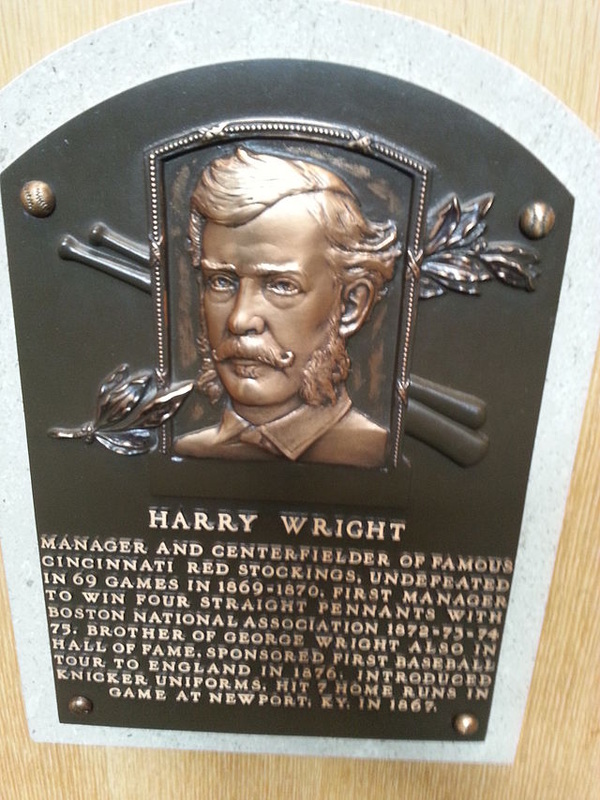A year later, baseball became sort of popular. Wright had put his focus on a Cincinnati Baseball Club, one which assembled some of the most talented players of the time, including Wright and his brother George. Wright's team won 16 of 17 games in 1867 and in 1869 and 1870, the team had gone undefeated! During this time, Wright was playing and managing for the National Association of Base Ball Players. He joined the National Association in 1871, where he would play and manage the Boston Red Stockings from 1871-1875. These would be among the best teams to ever play the game of baseball. The team won 4 straight NA Pennants and Wright had a winning percentage as a manager of .789! That was the highest recorded winning percentage of any manager in the history of baseball for one club. What is even more fascinating is the fact that he did it with a record of 225-60, which is a clip that would be impressive if he were a Division I College Football Coach.
Taking over the Boston club of the new NL in 1876- it was called the Boston Red Caps, which allowed for the Cincinnati team to be called the Red Stockings- he player/ managed for three seasons before managing his last three there. After finishing just 8 games over .500 in his first season in the NL, Wright led his team to consecutive Pennants in 1877 and 1878 with 42-18 and 41-19 records, respectively. The combination of the Red Stockings teams of the NA and the Red Stockings teams of the NL signified the first ever dynasty in professional sports. Though the leagues were separate, it was known that Boston had a distinctive advantage in this still relatively known sport, baseball.
After two sub .500 seasons with the Red Stockings, he left to manage a team in Rhode Island called the Providence Grays, which had a total of two pitchers. One was Old Hoss Radbourn, arguably the most durable pitcher the game has ever seen. The other was another future Baseball Hall of Famer, John Montgomery Ward, who was also an OF and would later on become a manager and an all time baseball pioneer in his own right. Despite finishing 20 and 18 games over .500, respectively, Wright was not able to lead the Grays to the NL Pennant- they finished 2nd and 3rd over the two seasons he was there.
In 1883, there was a new baseball team in Philadelphia called the Quakers. They had a very bad first season and hired Wright to lead them for 1884. As in his experience in the Boston NL club, Wright needed a season to work out the kinks. The Quakers finished the 1884 season with a record of 39-73, good enough for 6th place in the NL. Starting in 1885, the Quakers (who became known as the Phillies starting in 1890) would finish with a record of over .500 for 7 of the next 9 seasons that Wright was at the helm. The only seasons the team failed to finish above .500 their records were 63-64 (in 1889) and 68-69 (in 1891). Because of his non chummy relationship with team owners, Wright's contract was not renewed for the 1894 season though the team finished at 72-57.
For Harry Wright's career (at least as it was recorded), Wright hit .277 for 4 seasons of 1871-1874. This included single games he appeared in during the years of 1875-1877. In addition to playing the OF, he also served as the relief pitcher. Harry Wright was really the game's first "Rolaids" Relief Man. He led the NL in saves each year from 1871-1874, with an impressive run of 3, 4, 4, and 3 saves, respectively, over the course of the 4 seasons.
Harry Wright hit 7 home runs... in a single game! Though Wright hit just 4 in his career in the National Association, he had a single game in 1867, playing in Cincinnati. It happened in Newport, KY and Wright would hit 7 home runs in a single game. Impressive whenever it was done, but more impressive because it was done during a time where a home run was not even defined. I wish I could have seen the box score and scoring summary for that game.
Wright's 10 years in Philadelphia brought his overall managerial winning percentage down for what would have been history defining. Like I mentioned before, he had a .789 WP in his 5 seasons in the NA with Boston. He followed that up with a .576 WP in his 6 seasons in Boston in the NL and a .604 WP in his 2 seasons in Providence. His WP in Philadelphia was .529 which brought his career WP in Boston, Providence and Philadelphia to .581. To be fair, his record in his 4 seasons of Cincinnati should be factored in as well. He was 16-1 in 1967, did not lose much in 1868 and finished undefeated in 1869 and 1870. No doubt, the most successful baseball manager in the history of the sport.


 RSS Feed
RSS Feed
